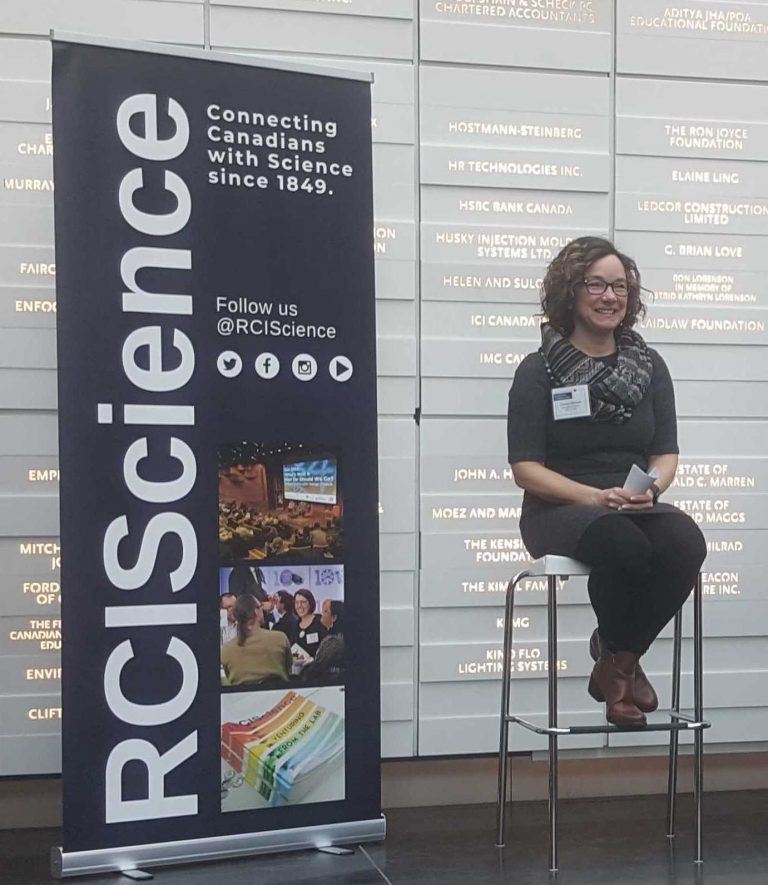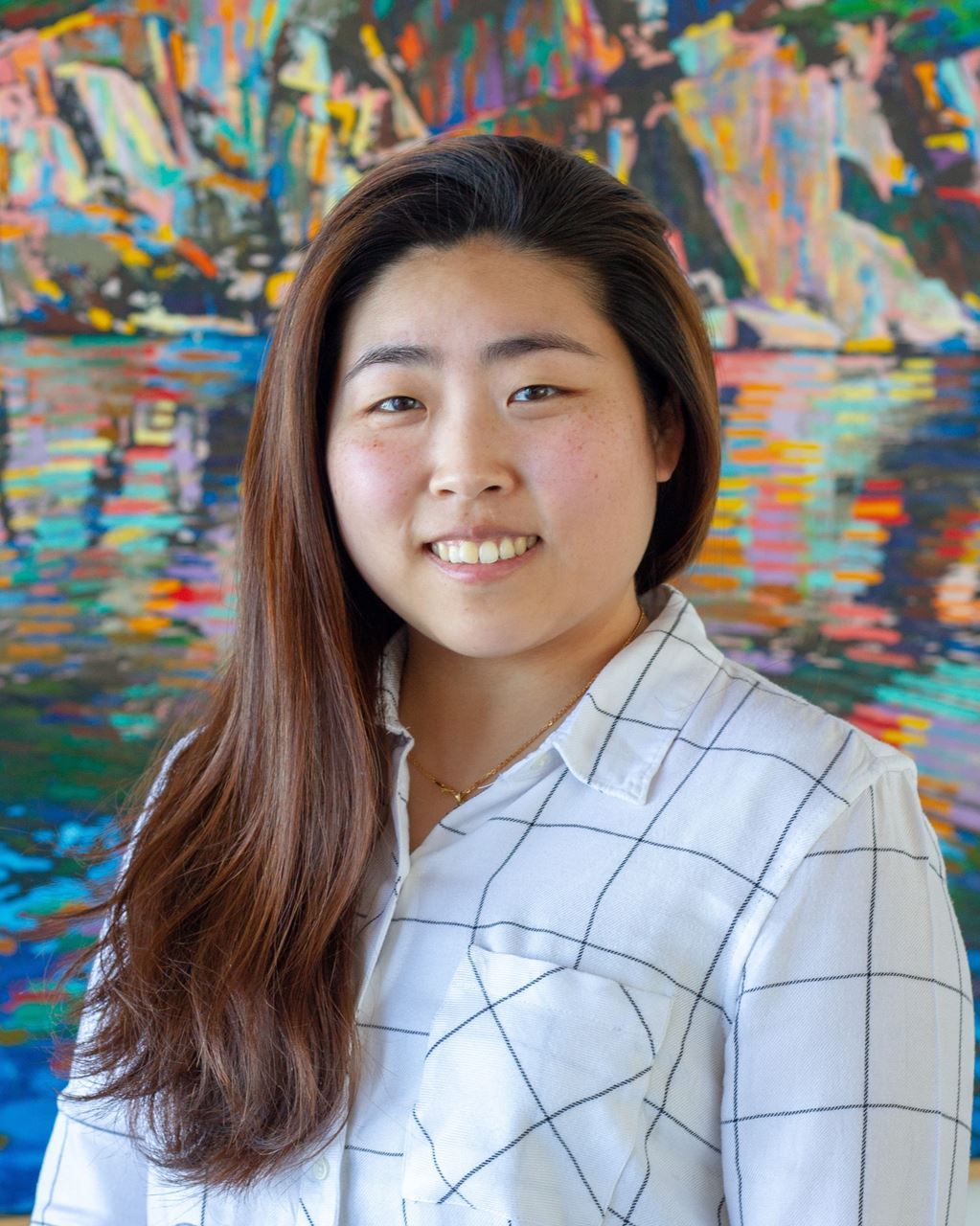Reposted from CIC News

Chantal Barriault pictured at RCIScience. Photo credit: Ki-Youn Kim.
As the ranks of the world’s professional journalists have been decimated over the past few decades, so too has their ability to report the work of science to an audience that extends beyond the scientific community itself. If you are part of that audience, you may not have noticed, because there appears to be more news about science than ever. Now the source is a new cadre of science communicators who are employed not by traditional media organizations but instead by bodies such as research institutes and universities. Yet while the burgeoning field dubbed “scicomm” continues to grow, key questions are beginning to emerge about its lack of diversity and the implications that could have for the way science is being presented to the public.
Such questions echoed through the themes of SciCommTO, a two-day conference organized by the Royal Canadian Institute for Science, a venerable body with roots that go back to the mid-19th century and some of the earliest scientific work being done in this land. About 120 participants attended this event last month at Ryerson University, where they explored a variety of topics such as how to interview researchers and frame an engaging narrative.
While much of this content amounted to a kind of vocational training, the exchanges occasionally turned contentious, as happened during a session about the professionalization of scicomm. These interactions spawned discussions offline and online that continued for several days and revealed some key challenges to be confronted.
Perhaps chief among those challenges is the fact scicomm has become a trend, a hashtag, and a community, all thanks to some savvy scientists on social media. At the same time, science communication qualifies as an academically respected social science discipline with its own research standards and evidence-based best practices.
That is why the conference, organized in collaboration with Ryerson’s own scicomm initiative SciXChange, was so valuable. It provided a space to learn and discuss evidence-based science communication, an area that currently offers few formal training opportunities in Canada. Laurentian University is the only school in Canada, and one of just a handful around the world, that offers a recognized post-secondary program in science communication.
Conference delegates, many of whom were women completing or finished their PhDs, shared that their peers outside of the science communication community saw science communication as something to “fall back on” if their academic career in science did not work out. Others, who indicated they already felt excluded from their chosen scientific work, portrayed the science communication community as a “safe space” where they belonged. And there were working scientists who suggested they were there because science communication was something impactful and fun to do in addition to their research.
There was also a small group of delegates with science communication degrees at the conference who were building careers. They voiced a concern about not being recognized as credible professionals in the field because science communication was being viewed as hobby or lacking legitimacy due to its social science nature. Additionally, one of the biggest challenges this group faces is having their work and expertise constantly undervalued because a lot of science communication hobbyists do work for free.
These perspectives were reinforced during a panel discussion, called “Canada vs. The World”, where Dominic McDonald, Head of Education at the Royal Institution in the UK, said that the vast majority of the science communicators in the UK were white, middle-class women with PhDs. In Canada, Dr. Chantal Barriault, the Program Director of the Science Communication program at Laurentian University, confirmed that the field is a monoculture reflecting this trend, putting the number of such women at 75%.
While these observations might be regarded as just one more example of how poorly the scientific community welcomes and supports women, this lack of diversity in science communication may become an even bigger concern. When the topic of professionalizing the field of science communication was brought up by Barriault, it was met with mixed responses. Her argument was that this would provide legitimacy for the work to be taken seriously and provide opportunities for anyone interested to have more training opportunities. She likened the process to the history of nursing, which was not initially regarded as a real career involving specialized skills and training, nor even compensated. It did not take on its modern value in as an esteemed part of the healthcare system until the field was professionalized.
The same problem applies to scicomm, where many practitioners do not acknowledge the evidence-based strategies that are essential to communicating and debunking myths about contentious issues, such as vaccines, climate change, and viral outbreaks. When these methods are not used, it can worsen a situation by isolating the audience or propagating misinformation.
Nevertheless, some opposed remain wary of professionalizing as a form of gatekeeping. Many scientists voiced the concerns on Twitter that if science communication is professionalized, it would be no different from how science had excluded them. Yet professionalizing science communication does not mean that scientists cannot continue sharing their research on social media or giving public lectures. In fact, professionalizing science communication would provide more resources and training opportunities for everyone interested. It would also reward both scientists and professional science communicators for their passion and work.
Currently, science communication will only continue to grow in Canada, as it should, seeing how it bridges sciences and society. To meet this demand, professionalizing the field means that it would lead to more training and projects that bring value for both scientists who want to continue doing science communication as a hobby and for those who are paving the way for a career as a professional science communicator.
By: Ki-Youn Kim

Ki-Youn Kim is a science communicator based in Ottawa with a passion for life sciences and misinformation research. She completed her Master’s in Science Communication at Laurentian University and holds two bachelor’s degrees in Neuroscience (Carleton) and Biology (Queen’s). Currently, she works at the Chemical Institute of Canada while pursing side projects. Every Sunday, she shares science communication tips on Twitter (@kiyoun_k) under the hashtag #SciCommSunday.
